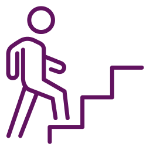As a student of Portsmouth Online, you will find everything you need to study in our digital learning environment, Moodle.
The dashboard is the front page. It shows you all the important information that you need to see at a glance. This is where your course information will appear. All of the resources you need for your degree can be accessed online at any time. Course materials include research papers, books, podcast links, and more.
Each week, a new discussion forum is created by your online tutor. This is where you will be invited to discuss your forum activity with other students to cement your understanding of the learning outcomes for that week. Throughout your studies with Portsmouth Online, you will have the opportunity to attend regular webinars where you'll be able to discuss your weekly content and share ideas with your peers and academic staff.
Assessments are handed in by uploading your work to Moodle. You will also be able to view your feedback and grades from Moodle itself. Throughout the course, you will be supported by online tutors and the student adviser team.
Online tutors will be able to answer any questions about the work that you are discussing and the student adviser team is available to answer all non academic questions.
Through Moodle, everything you need to be successful in your course is right at your fingertips. Get in touch with one of our course advisers for a one on one walk through.
.png?width=180&height=222&name=UoP_Study%20Online_Stacked%20(1).png)

.png)
















